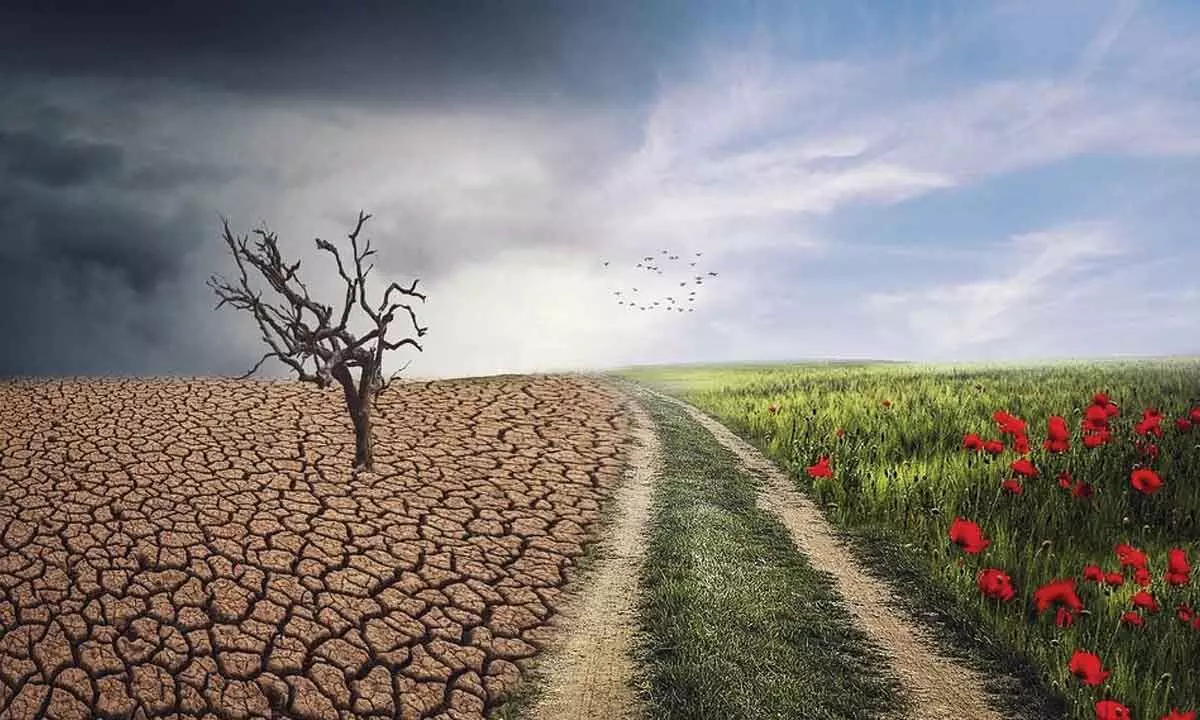Transparency is vital for democracy, environment
The Constitution of India is not a mere document. It is much beyond the reminder of citizen’s responsibilities. It is about a responsive government as well!
image for illustrative purpose

Climate change has been in the air, literally, for a long time (pun intended). Like American writer Charles Dudley Warner (1929-1900) said 'Everybody complains about the weather, but nobody does anything about it'. Nobody in today's context is the government and the people appointed and empowered to do something. Just to give a small example of a big development is that despite the worldwide warnings about the rising sea levels, the governments keep allowing more and more construction towards and even into the sea.
In this context, I was pleasantly surprised when the Centre-owned Press Information Bureau issued a press release, out of the blue, stating that the Union Ministry of Agriculture and Farmers Welfare is open to taking pro-farmer changes in Pradhan Mantri Fasal Bima Yojana (PMFBY) in response to the recent climate crisis and rapid technological advances.
Secretary, Agriculture and Farmers Welfare, Manoj Ahuja said – PIB does not specify where - since farming is exposed directly to such climatic catastrophes, it is important and critical to protect the vulnerable farming community of the country from the vagaries of Nature. As a result, demand for crop insurance is likely to increase and therefore we need much more emphasis on crop and other forms of rural/agricultural insurance products to provide sufficient insurance protection to the farmers in India.
Ahuja also pointed out, rightly so, that World Economic Forum's Global Risk Report 2022 categorises Extreme Weather Risk as 2nd largest risk over next 10 years period and such sudden shifts in weather patterns are capable of adversely impacting our country, where the responsibility to feed world's second highest population lies solely on the shoulders of the agriculture community. It therefore becomes imminent to the world as a whole.
The agriculture ministry said several reports of excess rainfall came from Maharashtra, Haryana and Punjab while Madhya Pradesh, Uttar Pradesh, Bihar and Jharkhand reported deficit rainfall, eventually damaging crops like paddy, pulses and oilseeds this year. Of late, instances of such uncertainties - thunderstorms, cyclones, droughts, heat waves, lightning, floods and landslides have also increased, occurring almost every day in India in the first 9 months of 2022, as reported in several Science and Environment Dailies and Journals. PMFBY is currently the largest crop insurance scheme in the world in terms of farmer enrolments, averaging 5.5 crore applications every year and third largest in terms of premium received.
Frankly, this announcement by Ahuja deserved much better dissemination than a mere PIB press release. The stakeholders' feedback is of utmost importance and this process more often than not neglected as we have seen during the process of inviting, and more than that, recording the public objections and suggestions for the environment impact assessment of large projects such as ports, cement plants and airports.
This is where I think we should all remind ourselves of the importance of the Constitution. As Prime Minister Narendra Modi said, "We the people in the Preamble is a call, an oath and a trust". Right sir. When the ministers take oath in the name of the Constitution, or swear by God of their respective religions, they send the message that they can be trusted. It is equivalent to 'Maa Kasam' that most of us say. You have to be trusted when you swear by your mother. The Prime Minister says in the same breath - Be it people or institutions, our responsibilities are our first priority. People vote for governments with trust and obviously a sense of responsibility and it is for the elected to see to it that the trust quotient is respected and maintained. Sermons are not one-way traffic. Even in the Bhagavad Gita, Lord Krishna listens to Parth and guides him on the path of the latter's responsibility in the epic Kurukshetra war. What Lord Krishna says and the subsequent Bhishma Uvacha are all about transparency in governance. The Constitution imbibes these virtues.
On July 22 this year, the United Nations General Assembly, that everyone on the planet has a right to a healthy environment. In a resolution passed Thursday morning at UN headquarters in New York City, the General Assembly said climate change and environmental degradation were some of the most pressing threats to humanity's future. It also called on states to step up efforts to ensure their people have access to a "clean, healthy and sustainable environment." Many believe that this resolution certainly gives environmental campaigners more ammunition to challenge ecologically destructive policies and projects.
The fathers of our Constitution had the foresight when they enshrined this in the nation's most important document. Article 51-A, Clause (g) addresses the fundamental obligations of citizens, and indicates that it is the responsibility of every Indian citizen to preserve and enhance the natural environment, including forests, lakes, rivers, and animals, as well as to have compassion for all living things.
Coming as it does at the increasing risks, the UN resolution sends a message that nobody can take nature, clean air and water, or a stable climate away from us – at least, not without a fight," said Inger Andersen, Executive Director of the UN Environment Programme (UNEP). The resolution comes as the planet grapples with what Andersen called a triple planetary crisis of climate change, nature and biodiversity loss, and pollution and waste. Left unchecked, the new resolution said those problems could have disastrous consequences for people around the world, especially the poor, and women and girls.
Thus, the issue of environment and climate change has come a long way from the Constitution of India to the UNGA resolution to COP27. We do not have time to leave it to the future to judge us as to what we are doing about the environment.
(The author is a Mumbai-based media veteran, known for his thought-provoking messaging)

